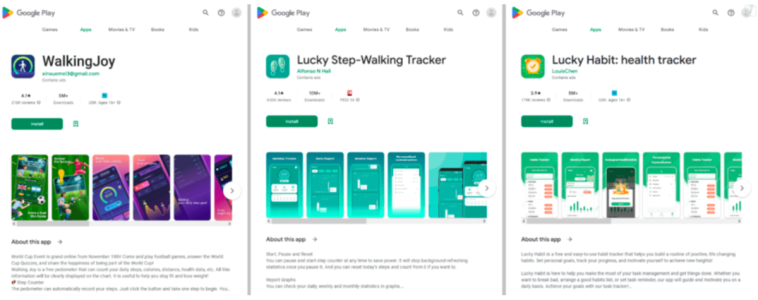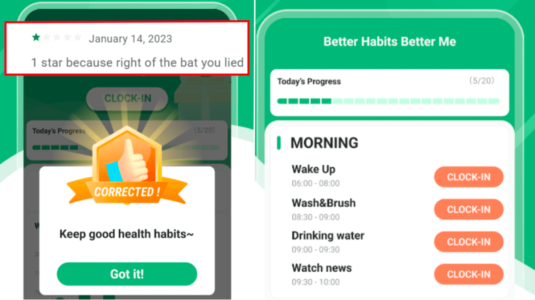Beware: Three malicious 'fitness' and 'money-making' apps are targeting Android users
- Replies 5
It's a known fact that as we age, self-care becomes even more crucial. So, props to all the go-getters out there who are taking their health into their own hands!
Exercising for just a few minutes each day can work wonders for our bodies and minds. In fact, even something as simple as regular brisk walking can boost our muscle strength and cognitive abilities.
But beware, Android users! If you're relying on fitness apps to keep you motivated, be careful because there are three apps that were recently reported as being fraudulent.
According to anti-virus company Doctor Web, there are 'fitness' apps that promise virtual rewards that can be exchanged for real money and online gift cards.
But surprise, surprise - the developers took away the ability to withdraw payment in a later update, leaving users with a worthless balance.

Not only were these users misled about earning rewards for their fitness tasks, but they were also bombarded with ads - and even encouraged to watch more to boost their reward balance.
These deceptive practices were uncovered in three apps - Lucky Habit: health tracker, WalkingJoy, and Lucky Step-Walking Tracker - all previously available on the Google Play Store with average star ratings above 3.9 stars.
At the time of writing, only Lucky Habit: health tracker remains available for download. Sadly, these apps have already been downloaded over 20 million times (cumulatively).
Once users collected the required two million coins, they were prompted to watch 30 more advertisements, only to find out they can't withdraw any money.
Some users even reported being served inappropriate videos, while others had to play the game for six months just to reach the withdrawal balance.
Monica Marks, an Android user, was promised $35 for her virtual rewards but ended up watching 'dirty videos' instead. Clint Edwards, another Android user, played for hours and built a credit balance, but was never credited.
And Patrick Ortiz, who played the game for over six months, had this to say: 'I reached the two million [coins requirement] and then the app said that I have to watch the ads 30 times. I played it for more than six months, and that is a lot of ads! Now that I've finished the game I can't withdraw.'
'It's a scam! What a waste of time.'

This serves as a warning to users who track their health using connected apps. While the convenience of health tracking apps can be a thrilling prospect, it comes with the same related concerns over data privacy and trustworthiness as with any other connected app.
Potential risks can include data leakage, targeted ads, and even receiving malicious content. To avoid such pitfalls, it is important to remain vigilant regarding app permissions, and familiarise oneself with any related privacy policies and terms and conditions in order to ensure data safety.
Recent research indicates that the prevalence of fraud and scams involving mobile apps is rising. Scammers can make their malicious apps look legitimate and are even creating fake app stores to further trick users into downloading their apps.
They are also using 'bait apps' which offer rewards for playing particular games or completing challenges. Once users have performed these tasks, the scammers take their money without providing the promised goods or services.
The consequences of using fraudulent apps can be far-reaching. In addition to the financial loss, users can have their personal data stolen and their devices infected with malicious software resulting in slow performance, unexpected charges and identity theft.
Protecting your mobile device from malicious apps is important to keep your time, data, and money safe. To ensure your device is protected, follow these steps:
Exercising for just a few minutes each day can work wonders for our bodies and minds. In fact, even something as simple as regular brisk walking can boost our muscle strength and cognitive abilities.
But beware, Android users! If you're relying on fitness apps to keep you motivated, be careful because there are three apps that were recently reported as being fraudulent.
According to anti-virus company Doctor Web, there are 'fitness' apps that promise virtual rewards that can be exchanged for real money and online gift cards.
But surprise, surprise - the developers took away the ability to withdraw payment in a later update, leaving users with a worthless balance.

Cyber experts are sounding the alarm on a series of dodgy applications that have been designed to exploit people into providing their personal data. Credit: Dr Web.
Not only were these users misled about earning rewards for their fitness tasks, but they were also bombarded with ads - and even encouraged to watch more to boost their reward balance.
These deceptive practices were uncovered in three apps - Lucky Habit: health tracker, WalkingJoy, and Lucky Step-Walking Tracker - all previously available on the Google Play Store with average star ratings above 3.9 stars.
At the time of writing, only Lucky Habit: health tracker remains available for download. Sadly, these apps have already been downloaded over 20 million times (cumulatively).
Once users collected the required two million coins, they were prompted to watch 30 more advertisements, only to find out they can't withdraw any money.
Some users even reported being served inappropriate videos, while others had to play the game for six months just to reach the withdrawal balance.
Monica Marks, an Android user, was promised $35 for her virtual rewards but ended up watching 'dirty videos' instead. Clint Edwards, another Android user, played for hours and built a credit balance, but was never credited.
And Patrick Ortiz, who played the game for over six months, had this to say: 'I reached the two million [coins requirement] and then the app said that I have to watch the ads 30 times. I played it for more than six months, and that is a lot of ads! Now that I've finished the game I can't withdraw.'
'It's a scam! What a waste of time.'
Key Takeaways
- Cyber experts are warning that three active apps claiming to track and encourage healthy habits are actually serving advertisements and lies.
- The deceptive apps are Lucky Habit: health tracker, WalkingJoy and Lucky Step-Walking Tracker.
- Users were told they needed to collect two million 'coins' to withdraw cash equivalent to around $35, but no withdrawal was possible.
- Android users who have downloaded the apps have reported being scammed, and some even had to watch inappropriate videos to try and accrue the required balance.
This serves as a warning to users who track their health using connected apps. While the convenience of health tracking apps can be a thrilling prospect, it comes with the same related concerns over data privacy and trustworthiness as with any other connected app.
Potential risks can include data leakage, targeted ads, and even receiving malicious content. To avoid such pitfalls, it is important to remain vigilant regarding app permissions, and familiarise oneself with any related privacy policies and terms and conditions in order to ensure data safety.
Recent research indicates that the prevalence of fraud and scams involving mobile apps is rising. Scammers can make their malicious apps look legitimate and are even creating fake app stores to further trick users into downloading their apps.
They are also using 'bait apps' which offer rewards for playing particular games or completing challenges. Once users have performed these tasks, the scammers take their money without providing the promised goods or services.
The consequences of using fraudulent apps can be far-reaching. In addition to the financial loss, users can have their personal data stolen and their devices infected with malicious software resulting in slow performance, unexpected charges and identity theft.
Protecting your mobile device from malicious apps is important to keep your time, data, and money safe. To ensure your device is protected, follow these steps:
- Download apps only from trusted sources, like the official Apple Store or Google Play Store.
- Read app descriptions and user reviews to make sure the app is legitimate.
- Be mindful of permissions requested by the app and research their legitimacy.
- Keep your device updated with the latest security patches.
- Use a mobile security solution for an extra layer of protection against harmful apps.








